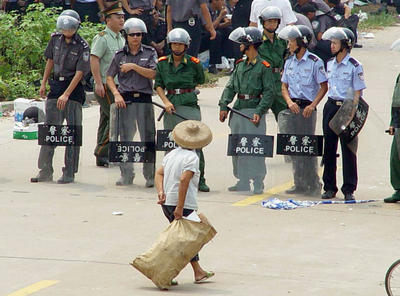Political intervention is the standard explanation for poorly performing courts in this region. But I will argue that politics is relatively unimportant in the numerous land cases in which state interests are not an issue. In resolving land claims, courts encounter more deeply rooted problems than a lack of judicial independence and may not be the most appropriate means of regulating this type of dispute.
Attempts by party leaders to legislate uniform land laws have not succeeded in displacing pre-existing community based self-regulatory systems. Decades of socialist land policies constrained self-regulation and private land markets without eliminating them. Following market liberalisations in the late 1970s, community based self-regulatory systems recovered their popularity and in some urban centres even began to rival state-backed procedures. In juggling competing land claims, courts today face a dilemma: do they uphold state laws that disregard local regulatory traditions and risk losing social relevance, or do they apply community notions of situational justice which undermine land rights codified in legislation? This is a significant problem because grievances about access to urban land pose a serious challenge to government legitimacy and social stability in China and Vietnam.
For decades self-regulatory communities in urban centres have constructed housing and land markets based on small contingent commonalities between community members, without a reference to abstract land rights. Consequently, just access to land is not primarily understood by referencing predetermined legal rules and rights, but rather by engaging sentiments of sympathy and solidarity with family and community.
Courts dealt with community disputes by flexibly applying the law. Socialist legal thinking discouraged judges from bringing legal discourse into conversation with the community norms and epistemological assumptions which informed self-regulating land markets. This promoted a bifurcated dispute-resolution system in which judges strictly enforced socialist legality to protect party and state interests while they applied the law only flexibly to other cases in order to accommodate the norms and epistemological assumptions animating the self-regulatory systems. Depending on the nature of the dispute and the status of the parties, judges would use both legal formalism and community based regulatory traditions.
Recent legislation extending greater recognition to private property rights has not reconciled these two systems, because the law continues to disregard self-regulatory approaches to land. To make the matter worse, judicialisation and the associated push for greater rule formalism insists that judges should become more detached from self-regulatory communities. As this policy gains momentum, pressure is mounting for judges to further insulate themselves from the community and uniformly apply standardised and exclusive property rights. At the same time, judges are expected to remain engaged with socialist legality and blur property rights to protect party and state interests.
Most judges seem to genuinely want their judgments to reflect self-regulatory approaches to land. Some even regard statutory property rights as an alien concept incommensurable with community beliefs. To engage with the community and put an end to disputes, they felt the need to reconcile property rights with community claims to property. Strictly enforcing exclusive property rights leads to winner-takes-all outcomes that fail to settle the underlying dispute because the losing parties frequently petition government and party authorities. Judges need discretionary flexibility to bridge the epistemic divide between state and community understandings about just access to land. Judges are concerned that rule formalism may have the unintended consequence of reducing their capacity to find lasting solutions to land disputes.
Another problem with judicialising land disputes is that conciliation and mediation are better at reconciling law with community justice than strict legal reasoning is. The purpose of law in judicial rulings is to create legal fictions that provide solutions to otherwise socially intractable problems. Despite decades of legal reforms, surveys routinely show that many citizens in China and Vietnam distrust legal solutions to land disputes.
Looking ahead, the centralising forces of rule formalism are unlikely to annihilate community property norms and practices. Despite the central state’s strong opposition, self-regulatory traditions have proved remarkably resilient and adaptable. In fact research suggests that no matter what the government does many urban residents are likely to continue using community based regulatory systems. But if the state recognises self-regulatory land systems, it will leave in place the power and epistemic relationships that undermine attempts at creating unified national land tenure regimes.
In searching for a regulatory response to land disputes the state will eventually need to find some accommodation between state and non-state systems. In the short term the dialogues that might encourage the state to learn from self-regulatory communities are most likely to occur in quasi-judicial citizen compliant tribunals that are given discretionary power to experimentally apply the law. These bodies have close links to government policy makers and can draw on their national expertise to craft a universal set of land law principles. To remain relevant courts need flexibility in applying the law: a requirement that calls into question rule formalism and the judicialisation of land disputes.
John Gillespie is Professor of Law and Director of the Asia Pacific Business Regulation Group, Department of Business Law and Taxation, Monash University.
This article was previously published in a past edition of the East Asia Forum Quarterly, Regulatory Reawakening.

